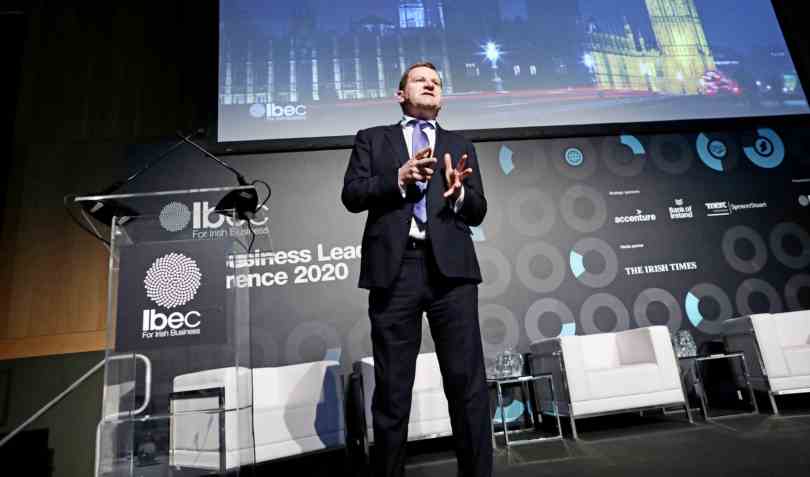Social consensus is needed to face Ireland's biggest challenges over the next decade, says Ibec chief executive Danny McCoy
Ireland needs to build a new national consensus to help provide solutions to the major business, societal and environmental challenges facing the country over the next decade. I am calling for the creation of a new national social dialogue and a new Commission on Taxation to assist in doing this.
A new social dialogue forum would consist of a range of stakeholders including business representative groups, trade unions, NGOs and other players in the civil society arena. Ibec has already had a positive initial contact with the Irish Congress of Trade Unions in this regard.
It has been clear from our members that quality of life issues such as childcare, congestion, environmental, housing and public services are posing significant challenges to employers and employees alike.
While there is understandably a lot of noise currently in the post-election environment, it is imperative that we in business and civil society discern the signal that is being sent. There is now a renewed urgency to solving these major problems facing the country.
Ireland is now experiencing major political fragmentation and it is more important than ever that we find a mechanism to help move the country forward through effective policymaking. We are being confronted with new challenges and problems which are, by and large, the by-products of being prosperous and successful.
At the heart of the dilemma is the belief that business has gotten too big, too fast for our society to cope with because the public realm has not scaled quickly enough. The prescription for a remedy is that Ireland needs a new social dialogue to address the trade-offs between public-private, urban-rural, the pivot to carbon neutrality and the underpinning of peace and prosperity for the island.
And what of that central theme – the idea that business has gotten too big, too fast? Such has been the level and pace of private sector investment it raises the question: is the state now too small for the scale of the resources that exist in our society?
Of the 2.3 million in work, approximately 350,000 of those are in the public sector. This is around the same number as when the financial crash and recession occurred a decade ago. But in the subsequent period the private sector has increased substantially the number of workers it employs.
If you look at demographics, Ireland’s population increased strongly over the last decade. At the turn of this year, there were an additional 346,000 living in the state as compared to 2011.
Dramatic Imbalance
The fact is, the scale of business in Ireland is now disproportionate vis-a-vis the scale of the state. The ratio of private to public jobs since 2014, with the creation 400,000 new private sector jobs, is a stunning 25 to 1. This is a dramatic imbalance.
In fairness to the last government, it increased public investment as economic recovery improved the public finances. But the sheer scale of the private sector investment and growth since 2014, a wall of private investment, coupled with parallel surges in the population and private sector workforce, means the ratio is now out of kilter. And it is this imbalance which is leading to a surging demand for public infrastructure and public services.
To have good regulation, we need more planners. To have adequate security, we need more gardai and defence forces. In health, we need more medics, in education, more teachers. In summary, we need more public services delivered. The key point is that we have allowed parts of the public service to become proportionately too small for business and society to continue to thrive.
This is what I mean when I say: business has gotten too big, too fast. And for the avoidance of doubt: that is not to say that Ireland would be better off if business was to be smaller. The opposite applies, in fact. It is business which provides the resources to make Ireland a better place to live and work.
A key plank of Ibec’s general election campaign was the call for a new Commission on Taxation to be created.
We need to do so to ensure our tax system is sustainable. Events at the OECD may bring very significant changes to the international corporate tax system. This commission is needed to bring coherence and to underpin our taxation system, while incentivising indigenous business and ensuring fairness in the personal tax regime.
To address all of these significant challenges individually and in the round, it is time for a new and wider social dialogue between business, trade unions, and NGOs to discuss how we are going to allocate resources within our society and, equally importantly, how we do so in a sustainable manner across the three realms social, economic and environmental.
And after last week’s general election, such a forum takes on added meaning. While there is understandably a lot of noise in the post-election environment, it is imperative that we in business and in civil society discern the signal that is being sent.
Harness Family Savings
There is now a renewed urgency to solving these major problems facing the country. As the political system becomes more fragmented, it is more important than ever that we find a mechanism to help move the country forward through effective policy making.
If social dialogue provides the framework for solving some of our challenges, what in practical terms can we do to fund the very significant investment that will be required to make progress?
As a nation, we are living within our means and indeed generating a surplus. But what is also clear is that the country has incorporated the corporate tax windfall into our day to day spending. This cannot last forever so we need to look elsewhere for solutions.
Part of the answer may lie at household level. Since the crash, Irish households have significantly deleveraged and are now down to levels last seen in 2003. Despite persistently low interest, Irish households are increasingly choosing to save rather than borrow. Over the last two years, savings levels in Ireland have remained high and on a par with the EU average. Last year, consumers had a record €101 billion in Ireland’s bank and credit union accounts.
And as the economy has recovered and wages have grown since 2014, disposable income continues to rise on an aggregate basis. If you strip out GDP, median disposable income in Ireland is 50% higher than in the UK. Households have the wealth and may or may not want to give it up willingly. So, we need to encourage them to do so by borrowing from them through a range of innovative measures such as university bonds to fund improvements in our ailing third level education sector.
In conclusion, at Ibec we believe business is a force for good in Ireland by providing every one of us with the opportunity to lead successful lives, while also delivering the resources for a balanced and more prosperous society. The challenges are simply too vast to be tackled in individual silos. We need a new social dialogue to build a national consensus that will enable us to tackle these challenges collectively.
We need to take a fresh look at Ireland’s governance model. What would best-in-class governance look like? It would have a framework capable of building a sustainable Ireland – sustainable in the social, economic and environmental spheres.
• Danny McCoy (pictured) is chief executive of Ibec, the Irish business employers confederation. The blog is extracted from his address to the annual Ibec Business Leaders Conference 2020
Pic: Julien Behal Photography












